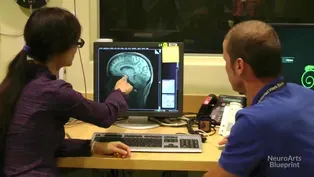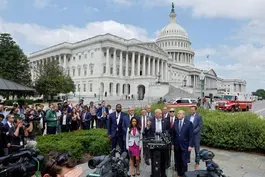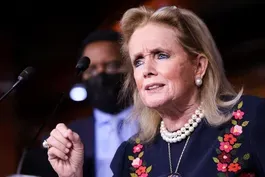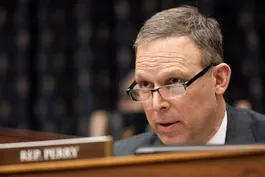
How Rosalynn Carter reduced stigma around mental health
Clip: 5/30/2023 | 5m 59sVideo has Closed Captions
How Rosalynn Carter reduced stigma around mental health and caregiving
Former First Lady Rosalynn Carter has been diagnosed with dementia. That news comes about three months after it was announced her husband, former President Jimmy Carter, was moving into hospice care. Caregiving has been a major focus of Mrs. Carter’s life and work. William Brangham looks at that legacy and the impact dementia has on millions of families.
Problems with Closed Captions? Closed Captioning Feedback
Problems with Closed Captions? Closed Captioning Feedback
Major corporate funding for the PBS News Hour is provided by BDO, BNSF, Consumer Cellular, American Cruise Lines, and Raymond James. Funding for the PBS NewsHour Weekend is provided by...

How Rosalynn Carter reduced stigma around mental health
Clip: 5/30/2023 | 5m 59sVideo has Closed Captions
Former First Lady Rosalynn Carter has been diagnosed with dementia. That news comes about three months after it was announced her husband, former President Jimmy Carter, was moving into hospice care. Caregiving has been a major focus of Mrs. Carter’s life and work. William Brangham looks at that legacy and the impact dementia has on millions of families.
Problems with Closed Captions? Closed Captioning Feedback
How to Watch PBS News Hour
PBS News Hour is available to stream on pbs.org and the free PBS App, available on iPhone, Apple TV, Android TV, Android smartphones, Amazon Fire TV, Amazon Fire Tablet, Roku, Samsung Smart TV, and Vizio.
Providing Support for PBS.org
Learn Moreabout PBS online sponsorshipGEOFF BENNETT: Former first lady Rosalynn Carter has been diagnosed with dementia.
That news comes about three months after it was announced that her husband, former President Jimmy Carter, was moving into hospice care.
Caregiving has been a major focus of Mrs. Carter's life and work.
William Brangham looks at that legacy and the impact that dementia has on millions of families.
WILLIAM BRANGHAM: Geoff, Rosalynn Carter has long focused on the importance of mental health ever since leaving the White House.
In fact, she founded an institute for caregiving years later.
More than 50 million people worldwide have dementia.
And in the statement announcing Mrs. Carter's condition, her team said that about one in 10 Americans who are 65 and older have dementia.
Kathryn Cade is vice chair of The Carter Center and serves on The Carter Center's Mental Health task force.
She's a longtime friend of the first lady and a former aide from when she was in the White House.
Kathy, thank you so much for being here.
I mean, as I mentioned, you worked with the former first lady in the White House and have been a friend and adviser ever since.
For a woman who has dedicated so much of her life to caregiving and to mental health care, this news today must land with you all with a particular resonance and significance.
KATHY CADE, Vice Chair, The Carter Center: Mrs. Carter has been a mental health advocate for more than 50 years.
And she has constantly worked to fight the stigma and the discrimination that holds back progress in the mental health field and keeps us from providing supports to family caregivers, who are often the front line when a diagnosis like dementia is made.
And so I think that Mrs. Carter has always been a fierce advocate of speaking out, speaking honestly and openly about mental health challenges, and supporting the needs of caregivers.
And so while I personally am deeply saddened by the news today, I think that this gives us an opportunity to talk openly with our families and with our policymakers and with others in our community about what we need to do to advance better programs and supports for people who are struggling with mental illness and also people who are in the caregiving role.
We know that it's the beginning of a very long and complex journey.
WILLIAM BRANGHAM: As we were saying, this would -- this comes just a few months after President Carter revealed the news about his care.
The Carters have always been very frank about their health conditions.
Is that part of it that seems very intentional to try to chip away at the stigma?
KATHY CADE: I think, when the family decided to make this announcement, they really thought that they were doing something that had always been a priority for Mrs. Carter.
And that is to promote better public understanding of these needs -- of these issues and to really encourage many, many more conversations, both within families and also among our policymakers, because, at the end of the day, what Mrs. Carter has fought for, for over 50 years is to increase support and resources that are available to help -- to help families and individuals deal with mental health problems and help those who are in the caregiver role.
WILLIAM BRANGHAM: Speaking of those resources, I mean, we know that nearly six million Americans are suffering with dementia or other Alzheimer's-related conditions.
And not everyone is going to get the kind of care that a former first lady would.
Generally speaking, what kinds of resources are available for people and their caregivers in the country now?
KATHY CADE: I am someone who has dealt with dementia in my own family.
And I think that the most important message that I want to deliver is that people do need to reach out.
They need to reach out to their local physicians.
They can reach out to their areas on aging.
They can reach out to others in the faith community.
But the most important message I want to deliver is that it is a complex situation, and people really need to take advantage of the resources that are available.
Now, having said that, we know that there are many, many people in this country who, as you say, do not have access to good support systems and good care.
So, I think that, for the country as a whole, we need to recognize that we -- the job is not yet done.
Until we acknowledge that there is a caregiving crisis, we are failing our families.
And I think one of the -- as the Carter family faces this particular journey, I am confident that they will do it with sort of the same courage, the same grace, the same integrity that they have approached every other challenge.
And I think, for President and Mrs. Carter, they will approach this in the same way that they have lived their lives for over 75 years, which is together.
And so I think that that message of courage, that message of compassion, that message of empathy for people who are dealing with these major life experiences is very important.
And I think that we need to mobilize across this country.
You can make major changes in how we finance mental health care.
You can get to a point where mental health is treated the same way as physical health.
And you can get to the point where every family that is on a caregiving journey knows that they are not alone and that they can be supported and helped in that journey, and that it is very, very important that they reach out to others in order to get that help and support.
WILLIAM BRANGHAM: All right, Kathy Cade of The Carter Center, thank you so much for talking with us.
KATHY CADE: Thank you.
It's been my honor to talk with you and about Mrs. Carter.
Blend of science and art improving neurological health
Video has Closed Captions
Clip: 5/30/2023 | 7m 45s | How a blend of science and art is improving neurological health (7m 45s)
Could drone attacks change how Russian people perceive war?
Video has Closed Captions
Clip: 5/30/2023 | 8m 24s | Could drone attacks in Moscow change how Russian people perceive Putin's war in Ukraine? (8m 24s)
Debt battle in House where some in both parties oppose it
Video has Closed Captions
Clip: 5/30/2023 | 3m 14s | Debt ceiling and budget battle now in House where some in both parties oppose it (3m 14s)
Debt ceiling deal faces 1st hurdle in House Rules Committee
Video has Closed Captions
Clip: 5/30/2023 | 4m 17s | Debt ceiling agreement expected to clear 1st hurdle in House Rules Committee (4m 17s)
Democratic Rep. Dingell discusses concerns with debt deal
Video has Closed Captions
Clip: 5/30/2023 | 6m 22s | Democratic Rep. Debbie Dingell discusses her concerns with the debt deal (6m 22s)
GOP Rep. Scott Perry on why he will not back debt limit deal
Video has Closed Captions
Clip: 5/30/2023 | 6m 42s | Republican Congressman Scott Perry on why he will not back the debt limit deal (6m 42s)
U.S. colleges divided over whether to end legacy admissions
Video has Closed Captions
Clip: 5/30/2023 | 5m 47s | U.S. colleges divided over whether to end legacy admissions (5m 47s)
Providing Support for PBS.org
Learn Moreabout PBS online sponsorshipSupport for PBS provided by:
Major corporate funding for the PBS News Hour is provided by BDO, BNSF, Consumer Cellular, American Cruise Lines, and Raymond James. Funding for the PBS NewsHour Weekend is provided by...
















